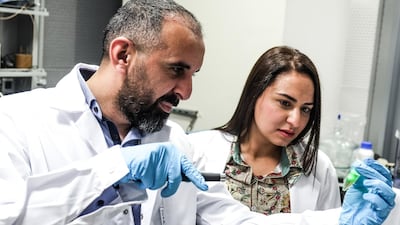Researchers at New York University Abu Dhabi developed a new oral delivery system for insulin that could replace the traditional injection used by diabetes patients.
They said the technology, which responds quickly to a rise in blood sugar, could improve the lives of those living with the disease.
Researchers at the university's Trabolsi Research Group developed layers of nanosheets with insulin loaded in between each layer.
In tests, patients' sugar levels returned to normal within two hours of swallowing the nanoparticles, which are designed to withstand stomach acid and release their active ingredient in the intestine.
The findings were published in the medical journal Chemical Science. The development of the oral treatment was carried out in collaboration with researchers from Algeria, Spain, Saudi Arabia, and the United Kingdom.
"Our work overcomes insulin oral delivery barriers," said Farah Benyettou, programme head of chemistry at Trabolsi.
"This technology responds quickly to an elevation in blood sugar, but would promptly shut off to prevent insulin overdose and will dramatically improve the well-being of diabetic patients across the UAE and worldwide.”
While there are already two FDA-approved technologies for the oral delivery of insulin, the system developed at NYUAD is biocompatible, highly stable in the stomach and is able to deliver the right amount of insulin based on the diabetic subject’s blood sugar levels.
In recent decades, rates of obesity and diabetes soared in the Middle East and North Africa, in part a result of sedentary lifestyles and poor diet.
More than one in six people in the UAE have diabetes and it is a factor in more than two thirds of deaths of people aged under 60.

